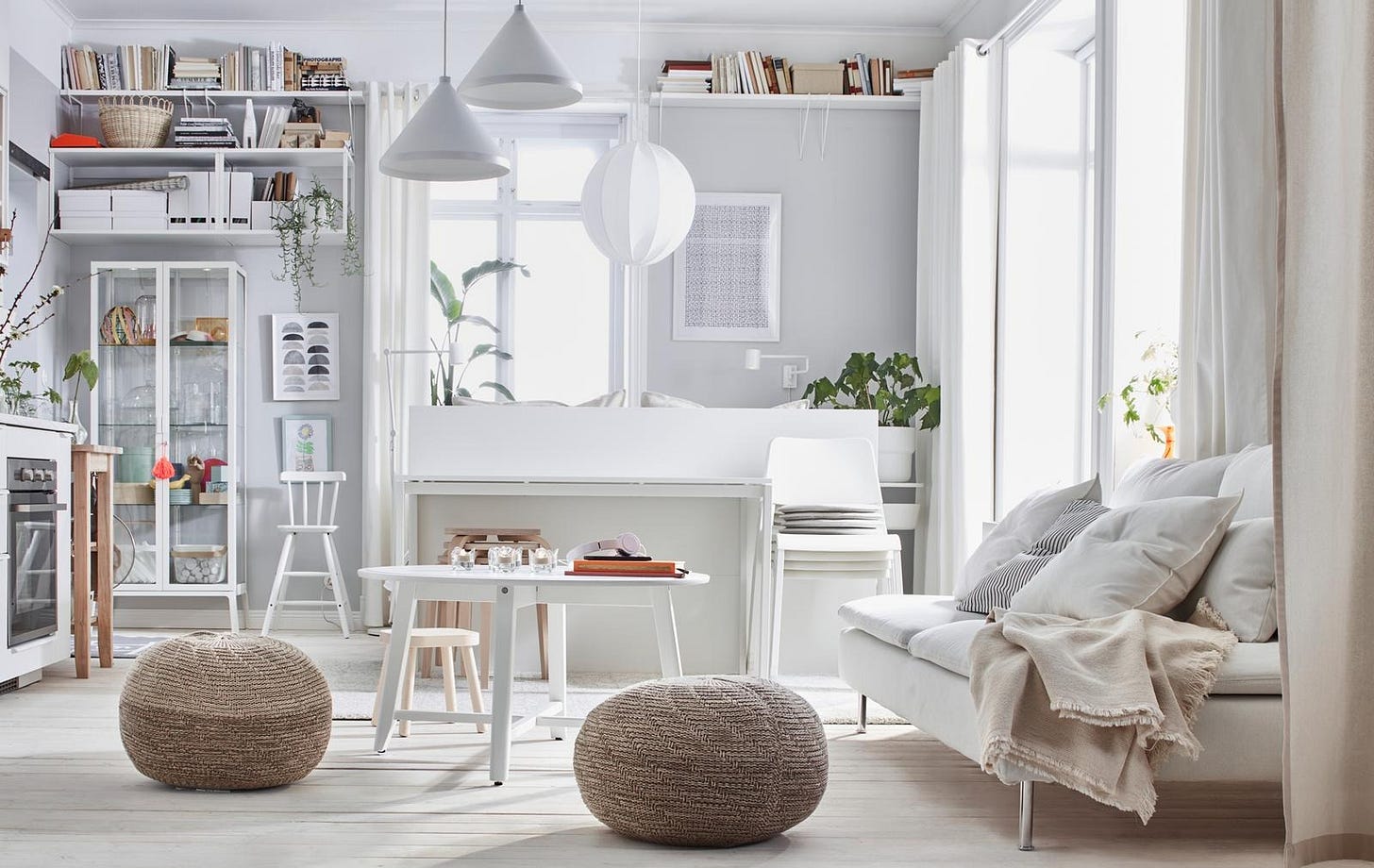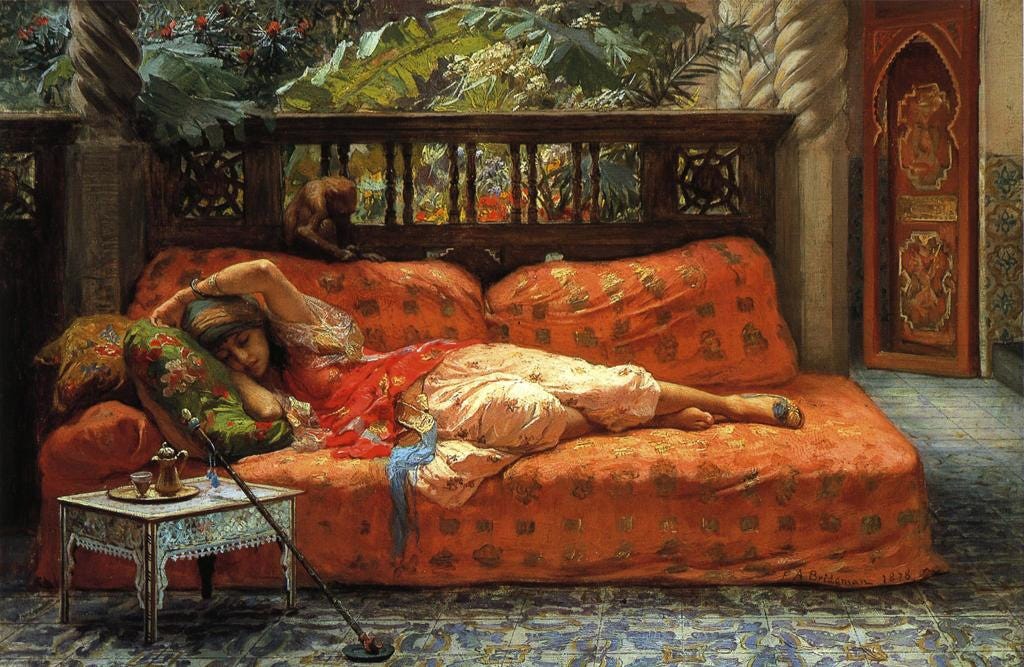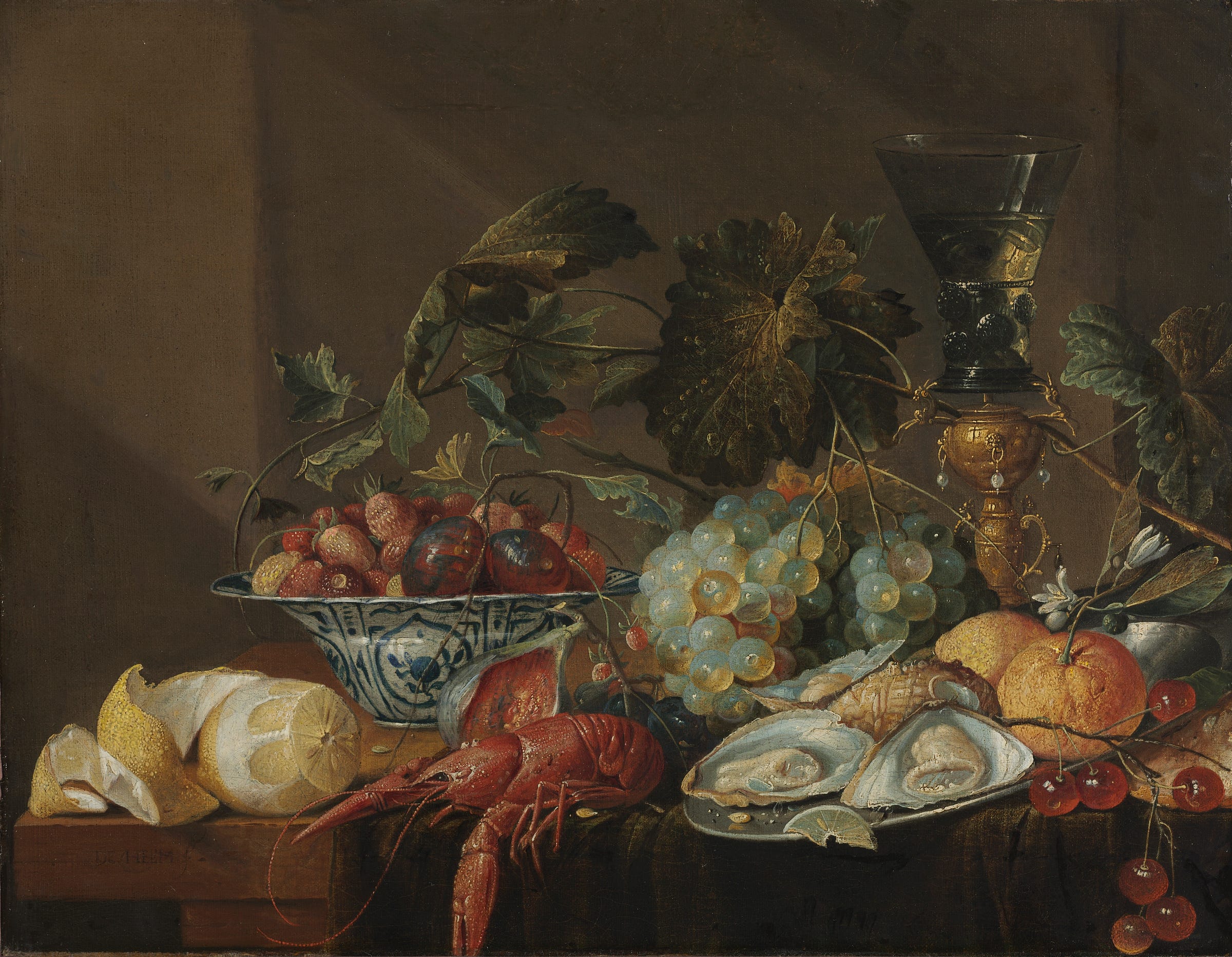Viscerality
some notes on pleasure
INTERVIEWER: There’s a certain esthetic to the way you live. You once talked about using good silver every day.
DIDION: Well, every day is all there is.
~ ~ ~
Pleasure comes first from the senses. The naive pleasure seeker, the pleasure dilettante, will use his senses to search out the obvious delights. Naturally he finds several. Beyond these fundamentals, however, the landscape of pleasure is more mysterious. An essential belief of mine is that one should treat pleasure as something of a skill — it can be learned, cultivated, appreciated. We can study our senses and more for the sake of pleasure. A few notes towards that end.
i
First: The modern world is in fact very pleasant. We have a thousand labor-saving devices. We are thoroughly accustomed to instant heat, cold, transportation, water, light. The elements are at our command in dials and switches. How ridiculous that must sound to most of history! How hard to believe. It matters very much that we remember and keep gratitude for these miracles.
But these miracles lead us to make unintentional tradeoffs. If we orient homes and lives solely around conveniences, we risk living more and more abstractly. It is today quite affordable to furnish an entire home instantly, but in doing so you are likely to create a realm that looks and feels quite sanitized. This is somewhat easy to see with IKEA ads:

Of course it’s not just about cost, the higher-end often welcomes even more sterility:

There has been a great atmospheric neutering. It extends beyond design of course. Today one can live in a permanently climate-controlled way if one chooses. One can travel from heated place to heated place in a pre-heated car that functions as a personal space-bubble. One could keep flip-flops on all winter, and live through summers with only the slightest notice of the heat. Modern convenience means that one can live in houses for years without so much as opening a window, and many choose to live this way.
Air conditioning is a miracle, but if we use it all summer long then we lose our visceral sense of being a part of our surroundings. When it’s hot outside you are hot. There is a pleasure in needing to dress down, in craving ice water, in having the windows open at night to hear the crickets. There is even sometimes a pleasure in the languor of an inescapable heat. More broadly there is a pleasure in comfort but also a pleasure in discomfort. They give a different shape to our spirit.
Cheap dinnerware is abundant, effectively free, as are a number of ugly things that fill up our kitchens, living rooms, bathrooms, bedrooms. It is more work to remove what is ugly than it is to let it in. It may not cost more money but it is at least more effort to seek out everyday objects that we might adore instead. How do we contend with this tradeoff? I think for nearly every aspect of life we have to ask ourselves: Do we want to see the world as heavy and intimate, or do we want to see it as convenient?
That does not mean we should give up air conditioning. We should adore its miracle of comfort. But we should be careful of the overreach. The danger of all this convenience is that one begins to live inside a very narrow band of the visceral world. I believe our surroundings exert themselves on us, gently but continuously. Everything we see and touch day to day conspires to shape our moods. When places are too antiseptic, we grow unaccustomed to noticing visceral details. We start to use less of our senses. Over time, our surface for pleasure thins.

This is easier to diagnose than it is to solve at scale. All sterile environments are alike, but all visceral ones are alive in their own way. Maybe that’s why its easier to advertise nearly full sterility, the audience will always appear wider. You have to choose what you value about the visceral world, no one else can do it for you. Perhaps I can help with some anecdotes.
ii
Joan Didion used fine silver every day because she was open to delights beyond convenience. She saw the pleasure of detail. It carried something visceral to her senses, something not trivial, that she noticed enough to cherish. To gratify our own senses we must cultivate this attention to detail. Eating a boiled egg is 6 grams of protein and 5 grams of fat. Eating a boiled egg from a nice egg cup, with a little spoon, on a picnic blanket outside is a lusty experience.
iii
One problem in living too abstractly, or too conveniently, is that you begin to think things like fine silver might only exist for special occasions. Or that luxury is a thing to be found at luxury destinations, in luxury hotels, or with specific luxury brands, and implicitly you might no longer search for ways to make your every-day life more exquisite.
I think there is a lot of luxury that we forget we can have. Probably you have encountered a version of this: I know of quite affluent people who drink mediocre coffee — not because they like it! When pressed it is because they are too busy to seek out what’s better. They cannot be bothered, somehow, to search for luxury. They do not wish to study. May this kind of idleness never find you.
People think luxury is event based or louis-vuitton or mercedes based when it is really fork based. There is more to the pleasures of the earth than what can be marketed to you. Every day is all there is based. Not only is the coffee a special miracle but the cup you drink out of can be special, what’s more it should be. It is part of the ritual of every day and you should properly respect that. It carries something to your senses, it should have your adoration. If it is not special throw it away. Beg your friend or your mother for a good cup. Buy one for your lover.
I hope you understand this goes well beyond coffee or silverware. There must be a fine silver of your own life, many of them. I cannot know what they are. But you can ask: The things you touch every single day, do they mean anything to you?
iiii
A beautiful rug that is falling apart is worth more than a pristine new rug of the now-common sterility. The new rug is not a product of beauty but of manufacturing ease. The wool rug, worn and fading, has a visceral and living beauty. People will say the old wool rug has “character”. What they mean is that it directly touches the senses. It has the thumb-print of life upon it.
v
There is a noticing to everything in your environment. Every person you meet — what do you love about the rasp of their voice? How are they dressed? What makes them beautiful? Can you really pay attention to them? The pleasure of detail is in your own concentration. The world has many versions of goosebumps.
vi
The abundance of the grocery store is a pleasure. But it is another pleasure entirely to eat no cherries until they are in season and then gorge yourself on cherries. To live near an orchard or to grow your own is more visceral still. How different is the experience of plums or peaches when you must grow them, defend them from pests and deer, test their firmness as they turn from stiff to yielding. Once in season you bring in more and more as the abundance overruns you, maybe you give some away, maybe some rot on the windowsill. The cycle of deprivation and then overabundance of harvest is inconvenient, but it is much more voluptuous. Some pleasures cannot be substituted.
vii
There are some who practice (and preach) detachment. I wish for the opposite. Where I, where I think anyone might, find the most satisfaction is in deepening attachments.
I think people would be better off if they learned to use the whole earth, not just a narrow band. All five senses. The world is a very sensual place, you know. People joke by saying “touch grass” but its much more than that. The inertia of life can lead us into an unconscious confinement, it takes some attention to get out of it.
I wish for a future that is more mossy and mysterious than anything we’ve dreamed up lately. I hope its nature displays inexhaustible fruitfulness and enchantments. Instead of striving towards some clean minimalism, we should strive to have gardens worth cultivating. You don’t have to literally keep a garden. But you have to find where you are going to lick the honey from the knife.
~ ~ ~
The first painting is Following in the Example of the Gods, by Henryk Siemiradzki, 1899
The middle painting is The Siesta, by Frederick Arthur Bridgman, 1878
The third painting is Still-Life with Crayfish, Oysters, and Fruit, by an unknown follower of Cornelis de Heem, late 1600’s or early 1700’s. Political upheaval in China circa 1640 effectively stopped imports, so the porcelain bowl would have been considered extremely valuable.




I wish you published more often, but to use your own analogy, the cycle of deprivation makes reading your work all the more pleasurable.
What a great essay. You wrote about air conditioning and it reminded me of a lesson on maximizing pleasure:
The ideal human temperature is 76° Fahrenheit, but maximum human pleasure is not staying at a constant 76°, it’s arriving at 76°. It’s being cold and warming up by a fire, or being hot and then cooling down with AC.